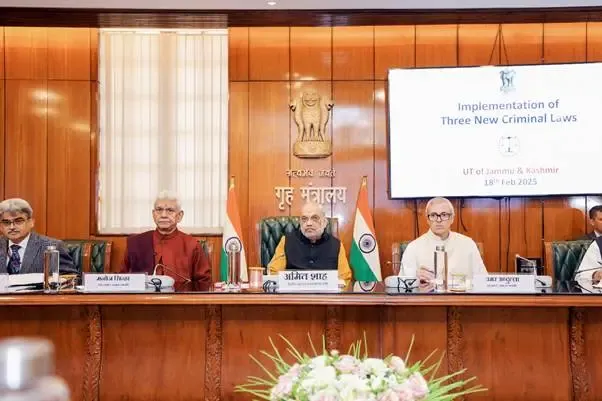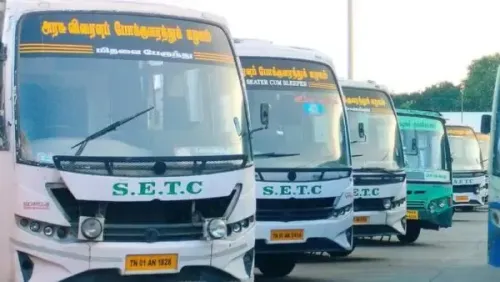Amit Shah Ensures Full Implementation of New Criminal Laws in J&K by April

Synopsis
Key Takeaways
- Implementation of three new criminal laws by April 2025.
- Emphasis on technology for speedy justice.
- Need for police personnel attitude change.
- Increased awareness among citizens about new laws.
- Monthly progress reviews by high-level officials.
New Delhi, Feb 18 (NationPress) Union Home Minister Amit Shah led a review meeting focused on the rollout of three new criminal laws in Jammu and Kashmir, attended by Lieutenant Governor Manoj Sinha and Chief Minister Omar Abdullah, in New Delhi on Tuesday.
The meeting assessed the current status and implementation of various new provisions concerning police, prisons, courts, prosecution, and forensics in Jammu and Kashmir.
Attendees included the Union Home Secretary, Chief Secretary, and Director General of Police of Jammu and Kashmir, alongside senior officials from the Ministry of Home Affairs (MHA) and the UT administration.
During discussions, Home Minister Shah urged the UT administration to ensure complete enforcement of the three new criminal laws, established under the guidance of Prime Minister Narendra Modi, by April 2025. He emphasized the importance of leveraging technology to facilitate swift justice under these new laws.
The Home Minister conveyed that transforming the mindset of police personnel and raising public awareness about the new laws is crucial for their effective implementation.
He noted that with a reduction in terrorism and enhanced security in Jammu and Kashmir, the police should shift focus towards protecting the rights of citizens. HM Shah mentioned the urgent requirement for utilizing the provision of Trial in Absentia within the union territory.
He highlighted the necessity of assigning responsibility to police officers to accelerate the process of filing chargesheets and recommended that every police station in Jammu and Kashmir maximize the use of the National Automated Fingerprint Identification System (NAFIS).
Training for investigating officers on the provisions of the new laws must be prioritized, according to HM Shah. He insisted that decisions regarding provisions related to terrorism and organized crime should undergo thorough scrutiny at the Superintendent of Police level. Strict oversight is essential to prevent misuse of these provisions.
The Home Minister acknowledged that the Jammu and Kashmir administration and government have made commendable progress in implementing the new criminal laws despite facing challenging conditions. He suggested that the implementation progress of the three new laws should be monitored monthly, fortnightly, and weekly by the Chief Minister, Chief Secretary, and Director General of Police, respectively.
Chief Minister Omar Abdullah, present at the meeting, remarked that certain vulnerable areas were highlighted as requiring immediate focus.
He clarified that in a Union Territory, the elected government does not hold responsibility for law enforcement but indicated that it could contribute to raising awareness about the new law.










